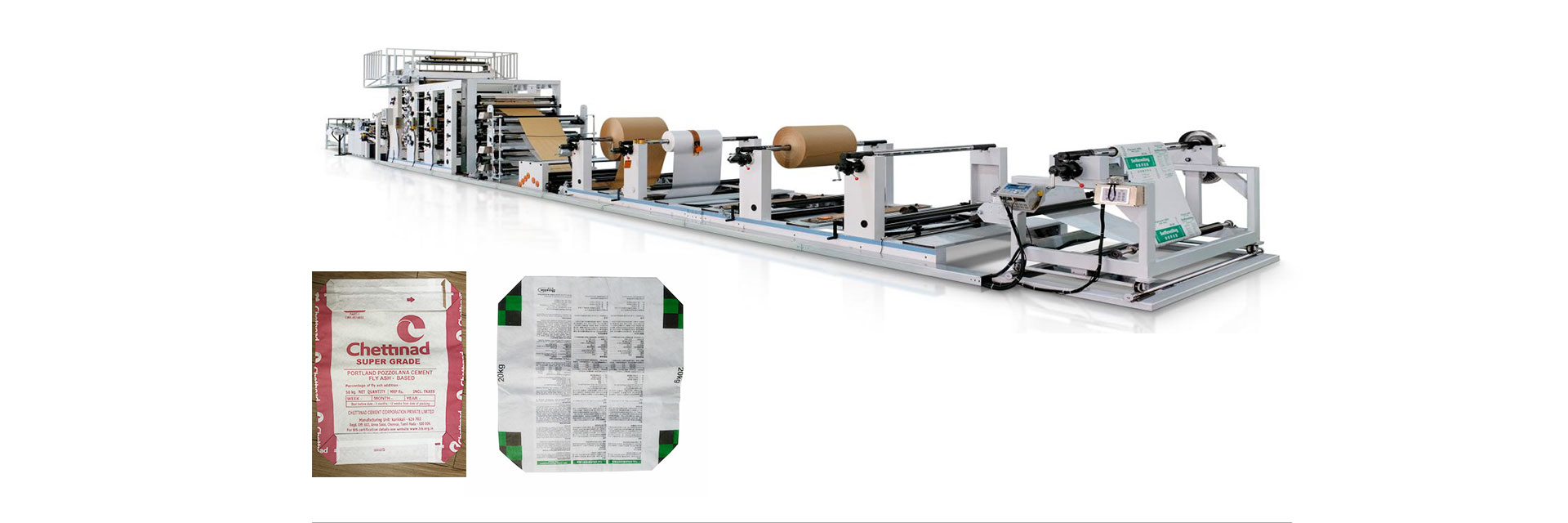Valve Cement Bag Production Line: What You Need to Know?
In the booming construction industry, cement remains a foundational material, and its packaging plays a vital role in maintaining quality, ease of transportation, and market competitiveness. One of the most effective packaging solutions in this sector is the valve cement bag, which is widely recognized for its dust-free filling, efficient stacking, and durability. At the heart of producing these bags lies the valve cement bag production line — a highly specialized and automated system engineered for large-scale, precise, and cost-effective manufacturing.
This article dives deep into what a valve cement bag production line entails, its key components, technologies, workflow, applications, and how to select the right manufacturer or supplier to suit your industrial packaging needs.
What is a Valve Cement Bag?
A valve cement bag is a type of industrial paper bag specifically designed for packaging powdery materials like cement, gypsum, lime, and fly ash. Unlike open-mouth bags, valve bags come with a self-closing valve that allows for fast filling and sealing without the need for additional stitching or adhesives. These bags are most often made from kraft paper, sometimes with a polyethylene liner for moisture protection.
Understanding the Valve Cement Bag Production Line
The valve cement bag production line is a fully integrated system designed to produce multi-wall valve paper bags with consistent quality and high productivity. It combines several mechanical, pneumatic, and electronic systems to ensure precise cutting, folding, gluing, printing, and valve formation.
A typical production line consists of the following modules
1. Roll Paper Feeding Unit
This is where the production begins. The unit unwinds kraft paper rolls, which are then directed to the tube-forming section. Automated tension control is crucial here to maintain paper alignment and avoid wrinkles.
2. Tube Forming Section
The paper is folded and glued into a tube shape. The number of layers (typically 2-4) depends on the desired strength and application of the bag. Precision gluing ensures structural integrity.
3. Bottom Pasting Machine
This unit folds and pastes the bottom of the bag while creating the valve opening. Advanced lines may use hot-melt adhesives to improve sealing quality.
4. Perforation and Ventilation Equipment
To prevent bursting during cement filling, the bags are perforated with micro-holes or ventilation strips. This is especially important for high-speed rotary packing machines.
5. Printing Unit
Many manufacturers integrate inline flexographic printing systems, allowing custom logos, batch information, or safety instructions to be printed directly on the bag surface.
6. Counting and Stacking System
After completion, finished bags are automatically counted and stacked, ready for bundling and dispatch. This minimizes human error and reduces labor costs.
Tecon High Speed Multiwall Valve Bag Making Machine
Key Features and Technologies
Modern valve cement bag production lines integrate several technologies for performance and quality:
● PLC Control Systems: Centralized touch-screen interfaces for operation monitoring, diagnostics, and maintenance.
● Servo Motor Drives: Ensures precise positioning and speed synchronization across different modules.
● Automatic Tension Adjusters: Maintain uniform tension across paper webs to avoid tearing or misalignment.
● Smart Gluing Systems: Monitors glue viscosity and application rate to ensure consistent bonding.
● Energy-Saving Design: Incorporates energy-efficient motors and heat recovery systems to reduce operational costs.
Benefits of a Valve Cement Bag Production Line
● Investing in a valve cement bag production line offers several advantages:
● High Output: Some lines can produce over 120 bags per minute.
● Consistent Quality: Ensures every bag meets dimensional and strength specifications.
● Cost Efficiency: Automated systems reduce labor costs and material waste.
● Customization: Easy integration of custom sizes, printing, and valve styles.
● Eco-Friendly: Kraft paper bags are biodegradable and recyclable.
Applications of Valve Paper Bags
Valve bags are not limited to cement packaging. The versatility of these bags makes them suitable for:
● Construction Materials: Cement, gypsum, sand mix, dry mortar, lime
● Agriculture: Fertilizer, animal feed
● Chemicals: Resin powder, additives, pigments
● Food Industry: Flour, starch (with food-grade liners)
As demand grows for dust-free, efficient packaging, the valve bag remains a key player in various industrial packaging applications.
Choosing the Right Valve Cement Bag Making Machine
Not all valve bag production lines are created equal. When evaluating suppliers or manufacturers, consider the following:
1. Production Capacity
Assess your daily/annual output requirements. Machines vary in speed and format flexibility.
2. Bag Type Compatibility
Ensure the machine supports your specific bag type, whether it's block bottom valve bags, multi-wall valve bags, or those with plastic liners.
3. Automation Level
Higher automation means lower labor, but may require skilled technicians. Look for features like auto reel change, remote diagnostics, and robotic stackers.
4. Maintenance and Support
Choose manufacturers that offer strong after-sales service, spare parts availability, and remote troubleshooting.
5. Energy Consumption
Modern machines with a low energy consumption design contribute to sustainability and reduce electricity bills.
Leading Manufacturer: Tecon Tuber and Bottomer Machine
If you are looking for a reliable and experienced valve cement bag making machine manufacturer, Tecon stands out as a strong choice. With 40 years of expertise in the design and production of paper bag machinery, Tecon offers fully automated valve bag production lines that support a wide range of industrial applications — from cement to chemical powders and food-grade materials.
Tecon tuber and bottomer machines are integral to modern valve bag manufacturing processes. Whether you’re starting a new production facility or scaling up your existing packaging line, Tecon offers turnkey solutions tailored to your operational goals.
Leading Tuber and Bottomer Machine Manufacturer
Conclusion
The valve cement bag production line is a cornerstone of modern industrial packaging, offering high speed, precision, and cost savings. Whether you're a cement plant looking to internalize packaging or a paper bag manufacturer expanding into industrial markets, investing in a well-designed and automated line is a strategic move. With the right machine configuration, quality raw materials, and a trusted supplier like Tecon, your operation can enjoy robust output and long-term competitiveness. Click to know more about Tecon tuber and bottomer machines.

